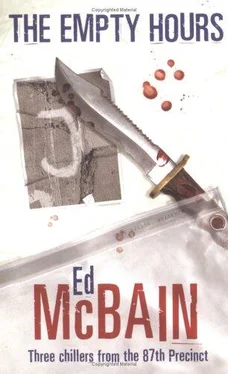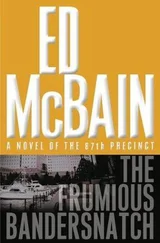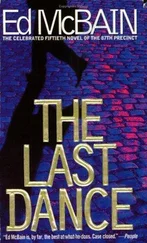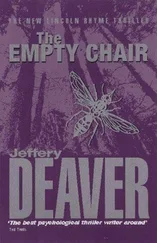Ed McBain - The Empty Hours
Здесь есть возможность читать онлайн «Ed McBain - The Empty Hours» весь текст электронной книги совершенно бесплатно (целиком полную версию без сокращений). В некоторых случаях можно слушать аудио, скачать через торрент в формате fb2 и присутствует краткое содержание. Жанр: Политический детектив, на английском языке. Описание произведения, (предисловие) а так же отзывы посетителей доступны на портале библиотеки ЛибКат.
- Название:The Empty Hours
- Автор:
- Жанр:
- Год:неизвестен
- ISBN:нет данных
- Рейтинг книги:3 / 5. Голосов: 1
-
Избранное:Добавить в избранное
- Отзывы:
-
Ваша оценка:
- 60
- 1
- 2
- 3
- 4
- 5
The Empty Hours: краткое содержание, описание и аннотация
Предлагаем к чтению аннотацию, описание, краткое содержание или предисловие (зависит от того, что написал сам автор книги «The Empty Hours»). Если вы не нашли необходимую информацию о книге — напишите в комментариях, мы постараемся отыскать её.
The Empty Hours — читать онлайн бесплатно полную книгу (весь текст) целиком
Ниже представлен текст книги, разбитый по страницам. Система сохранения места последней прочитанной страницы, позволяет с удобством читать онлайн бесплатно книгу «The Empty Hours», без необходимости каждый раз заново искать на чём Вы остановились. Поставьте закладку, и сможете в любой момент перейти на страницу, на которой закончили чтение.
Интервал:
Закладка:
“Why? What happened on August first?”
“You tell us.”
“I don’t know what I was doing.”
“Were you working?”
“I’m unemployed.”
“You know what we mean!”
“No. What do you mean?”
“Were you breaking into apartments?”
“No.”
“Speak up! Yes or no?”
“I said no.”
“He’s lying, Steve,’ Meyer said.
“Sure he is.”
“Yeah, sure I am. Look, cop, you got nothing on me but Burglary One, if that. And that you gotta prove in court. So stop trying to hang anything else on me. You ain’t got a chance.”
“Not unless those prints check out,” Carella said quickly.
“What prints?”
“The prints we found on the dead girl’s throat,” Carella lied.
“I was wearing ... !”
The small room went as still as death.
Reynolds sighed heavily. He looked at the floor.
“You want to tell us?”
“No,’ he said. “Go to hell.”
He finally told them. After twelve hours of repeated questioning he finally broke down. He hadn’t meant to kill her, he said. He didn’t even know anybody was in the apartment. He had looked in the bedroom, and the bed was empty. He hadn’t seen her asleep in one of the chairs, fully dressed. He had found the French money in a big jar on one of the shelves over the sink. He had taken the money and then accidentally dropped the jar, and she woke up and came into the room and saw him and began screaming. So he grabbed her by the throat. He only meant to shut her up. But she kept struggling. She was very strong. He kept holding on, but only to shut her up. She kept struggling, so he had to hold on. She kept struggling as if ... as if he’s really been trying to kill her, as if she didn’t want to lose her life. But that was manslaughter, wasn’t it? He wasn’t trying to kill her. That wasn’t homicide, was it?
“I didn’t mean to kill her!” he shouted as they took him into the elevator. “She began screaming! I’m not a killer! Look at me! Do I look like a killer?” And then, as the elevator began dropping to the basement, he shouted, “I’m a burglar!” as if proud of his profession, as if stating that he was something more than a common thief, a trained workman, a skilled artisan. “I’m not a killer! I’m a burglar!” he screamed. “I’m not a killer! I’m not a killer!” And his voice echoed down the elevator shaft as the car dropped to the basement and the waiting van.
They sat in the small room for several moments after he was gone.
“Hot in here,” Meyer said.
“Yeah.” Carella nodded.
“What’s the matter?”
“Nothing.”
“Maybe he’s right,” Meyer said. “Maybe he’s only a burglar.”
“He stopped being that the minute he stole a life, Meyer.”
“Josie Thompson stole a life, too.”
“No,” Carella said. He shook his head. “She only borrowed one. There’s a difference, Meyer.”
The room went silent.
“You feel like some coffee?” Meyer asked.
“Sure.”
They took the elevator down and then walked out into the brilliant August sunshine. The streets were teeming with life. They walked into the human swarm, but they were curiously silent.
At last Carella said, “I guess I think she shouldn’t be dead. I guess I think that someone who tried so hard to make a life shouldn’t have had it taken away from her.”
Meyer put his hand on Carella’s shoulder. “Listen,” he said earnestly. “It’s a job. It’s only a job.”
“Sure,” Carella said. “It’s only a job.”
“J”
1
It was the first of April, the day for fools.
It was also Saturday, and the day before Easter.
Death should not have come at all, but it had. And, having come, perhaps it was justified in its confusion. Today was the fool’s day, the day for practical jokes. Tomorrow was Easter, the day of the bonnet and egg, the day for the spring march of finery and frills. Oh, yes, it was rumored in some quarters of the city that Easter Sunday had something to do with a different sort of march at a place called Calvary, but it had been a long long time since death was vetoed and rendered null and void, and people have short memories, especially where holidays are concerned.
Today, Death was very much in evidence, and plainly confused. Striving as it was to reconcile the trappings of two holidays — or perhaps three — it succeeded in producing only a blended distortion.
The young man who lay on his back in the alley was wearing black, as if in mourning. But over the black, in contradiction, was a fine silken shawl, fringed at both ends. He seemed dressed for spring, but this was the fool’s day, and Death could not resist the temptation.
The black was punctuated with red and blue and white. The cobbled floor of the alley followed the same decorative scheme, red and blue and white, splashed about in gay spring abandon. Two overturned buckets of paint, one white, one blue, seemed to have ricocheted off the wall of the building and come to disorderly rest on the alley floor. The man’s shoes were spattered with paint. His black garment was covered with paint. His hands were drenched in paint. Blue and white, white and blue, his black garment, his silken shawl, the floor of the alley, the brick wall of the building before which he lay — all were splashed with blue and white.
The third color did not mix well with the others.
The third color was red, a little too primary, a little too bright.
The third color had not come from a paint can. The third color still spilled freely from two dozen open wounds on the man’s chest and stomach and neck and face and hands, staining the black, staining the silken shawl, spreading in a bright red pool on the alley floor, suffusing the paint with sunset, mingling with the paint but not mixing well, spreading until it touched the foot of the ladder lying crookedly along the wall, encircling the paintbrush lying at the wall’s base. The bristles of the brush were still wet with white paint. The man’s blood touched the bristles, and then trickled to the cement line where brick wall touched cobbled alley, flowed in an inching stream downward toward the street.
Someone had signed the wall.
On the wall, someone had painted, in bright, white paint, the single letter. J. Nothing more — only J.
The blood trickled down the alley to the city street.
Night was coming.
Detective Cotton Hawes was a tea drinker. He had picked up the habit from his minister father, the man who’d named him after Cotton Mather, the last of the red-hot Puritans. In the afternoons, the good Reverend Jeremiah Hawes had entertained members of his congregation, serving tea and cakes which his wife Matilda baked in the old, iron, kitchen oven. The boy, Cotton Hawes, had been allowed to join the tea-drinking congregation, thus developing a habit which had continued to this day.
At eight o’clock on the night of April first, while a young man lay in an alleyway with two dozen bleeding wounds shrieking in silence to the passersby on the street below, Hawes sat drinking tea. As a boy, he had downed the hot beverage in the book-lined study at the rear of the parish house, a mixture of Oolong and Pekoe which his mother brewed in the kitchen and served in English bone-china cups she had inherited from her grandmother. Tonight, he sat in the grubby, shopworn comfort of the 87th Precinct squadroom and drank, from a cardboard container, the tea Alf Miscolo has prepared in the clerical office. It was hot tea. That was about the most he could say for it.
The open, mesh-covered windows of the squadroom admitted a mild spring breeze from Grover Park across the way, a warm seductive breeze which made him wish he were outside on the street. It was criminal to be catching on a night like this. It was also boring. Aside from one wife-beating squeal, which Steve Carella was out checking this very minute, the telephone had been ominously quiet. In the silence of the squadroom, Hawes had managed to type up three overdue D.D. reports, two chits for gasoline and a bulletin-board notice to the men of the squad reminding them that this was the first of the month and time for them to cough up fifty cents each for the maintenance of Alf Miscolo’s improvised kitchen. He had also read a half-dozen FBI flyers, and listed in his little black memo book the license-plate numbers of two more stolen vehicles.
Читать дальшеИнтервал:
Закладка:
Похожие книги на «The Empty Hours»
Представляем Вашему вниманию похожие книги на «The Empty Hours» списком для выбора. Мы отобрали схожую по названию и смыслу литературу в надежде предоставить читателям больше вариантов отыскать новые, интересные, ещё непрочитанные произведения.
Обсуждение, отзывы о книге «The Empty Hours» и просто собственные мнения читателей. Оставьте ваши комментарии, напишите, что Вы думаете о произведении, его смысле или главных героях. Укажите что конкретно понравилось, а что нет, и почему Вы так считаете.












